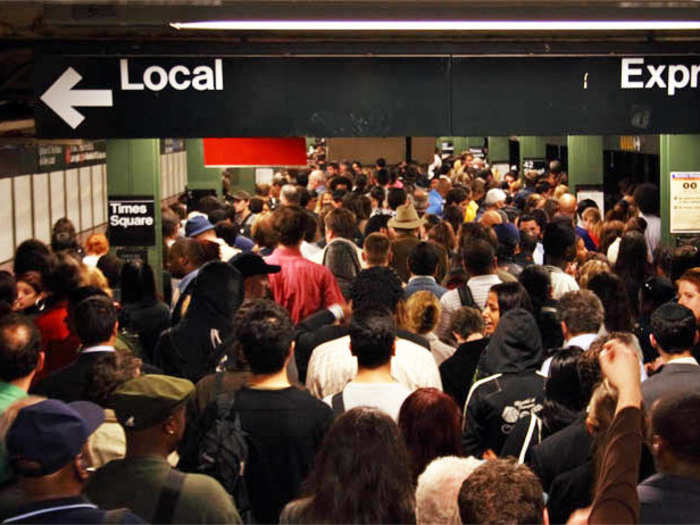
There's good news and bad news for riders of the MTA. On the one hand, Amazon employees commuting to Long Island City would be going against rush hour traffic. On the other, New York's subway system is already plagued by overcrowding and delays, making it ill-equipped to handle more passengers.
"If there's no reliability because the signals don't work and the cars are too old, then it doesn't matter what the capacity is," Danny Pearlstein, the policy and communications director at Riders Alliance, told Business Insider.
While Amazon has pledged to provide $600 million for transit and infrastructure improvements in the next four decades, the MTA estimates that New York would need $37 billion to fix its crumbling subway system.

In just a few short years, Long Island City has become increasingly unaffordable for both renters and homeowners. In the Hunters Point neighborhood, the area where many Amazon employees are likely to locate, the median home value is around $1.2 million — more than five times the national average, according to data from Trulia.
A recent analysis from home loan and mortgage company Mr. Cooper found that Amazon's HQ2 could drive up home prices in its chosen city by nearly 30%.
The same effect could apply to rents as well. At around $2,700 per month, rents in Hunters Point are nearly double the national average. Throughout all of the city, rents have increased by more than 5% from year to year.
If rising rents in Seattle — the site of Amazon's current headquarters — are any indication of what's to come, many Long Island City residents could soon be priced out.

Data from real estate site RENTCafé shows that apartments in Long Island City have exceeded 98% occupancy. With around 700 Amazon employees set to move into the city by 2019, that could make it difficult to find a place to live, and potentially drive up prices in the near future.
The good news is that Long Island City has around 15,400 apartment units under construction, though not all of them will be affordable for current residents.

Amazon's new headquarters has been touted as a way to increase local economic activity. Among many startups, the common understanding is that a rising tide lifts all boats: Amazon will introduce a new set of employees, who will then filter into existing businesses once they leave the company.
Data from the labor economists at ZipRecruiter discovered the opposite. According to their analysis, workers at mega-firms like Amazon don't tend to stay in the same city when looking for a new job. The economists said this effect was particularly strong among more educated and experienced employees.

As part of the Amazon deal, New York gave the company up to $1.7 billion in economic incentives. In reality, these incentives and tax breaks could be much higher, according to a recent analysis from Good Jobs First, the leading tracker of corporate subsidies in the US.
In an editorial for Fast Company, the director of Good Jobs First, Greg LeRoy, explained what happens when a company like Amazon doesn't pay their taxes.
"There will be a huge burden shift," he wrote. "Either everyone else's taxes will have to go up, or the quality of public services will have to go down, or some of both. There's no such thing as free growth."

As Amazon has expanded its presence in Seattle, local businesses have found it increasingly difficult to meet the demands of rising rents. In recent years, many beloved coffee shops, grocers, restaurants, and bars have been forced to shutter their doors.
After 25 years of business, an antique shop called Pike Place announced its closure with a sign outside the store: "The rent is too high," it read. "It is time to say goodbye."
As Amazon prepares to move into the Anable Basin, the fate of local businesses hangs in the balance. The popular Anable Basin Sailing Bar & Grill, for instance, is located in the middle of Amazon's future headquarter site.

Long Island City has a relatively small population, but it already struggles to combat homelessness. This spring, residents of the city's Blissville neighborhood opposed the conversion of a local hotel into a homeless shelter — one of many that have opened in the neighborhood this year.
In March, Councilman Van Bramer said his district was home to four times as many homeless individuals as it produced. This situation is likely to worsen as Amazon employees move in and nab available housing stock.
Take what's happened in Seattle: As Amazon spurred local economic growth, the city saw a troubling increase in homelessness, with the number of homeless residents rising by 9% each year since 2014.

Amazon may be powerless in the face of climate change, but it doesn't help that its second headquarters will be located directly along a flood zone. New research from Climate Central and the real estate site Zillow suggests that, under the most extreme projections of sea level rise, the Anable Basin could be partially flooded by 2050.
By the time the new headquarters is complete, there's a 45% chance that flooding will already have arrived in Queens.
 In second consecutive week of decline, forex kitty drops $2.28 bn to $640.33 bn
In second consecutive week of decline, forex kitty drops $2.28 bn to $640.33 bn
 SBI Life Q4 profit rises 4% to ₹811 crore
SBI Life Q4 profit rises 4% to ₹811 crore
 IMD predicts severe heatwave conditions over East, South Peninsular India for next five days
IMD predicts severe heatwave conditions over East, South Peninsular India for next five days

Copyright © 2024. Times Internet Limited. All rights reserved.For reprint rights. Times Syndication Service.